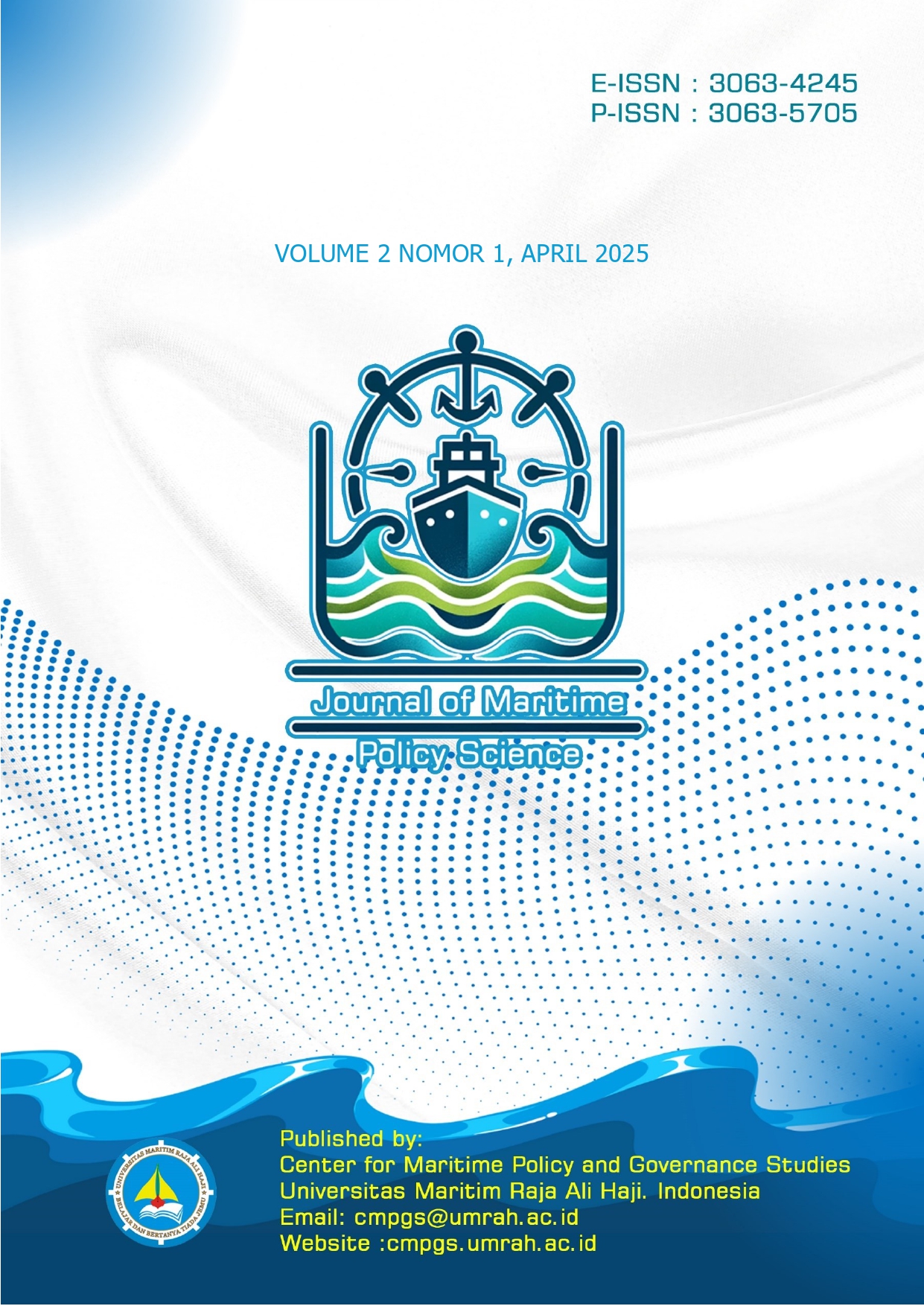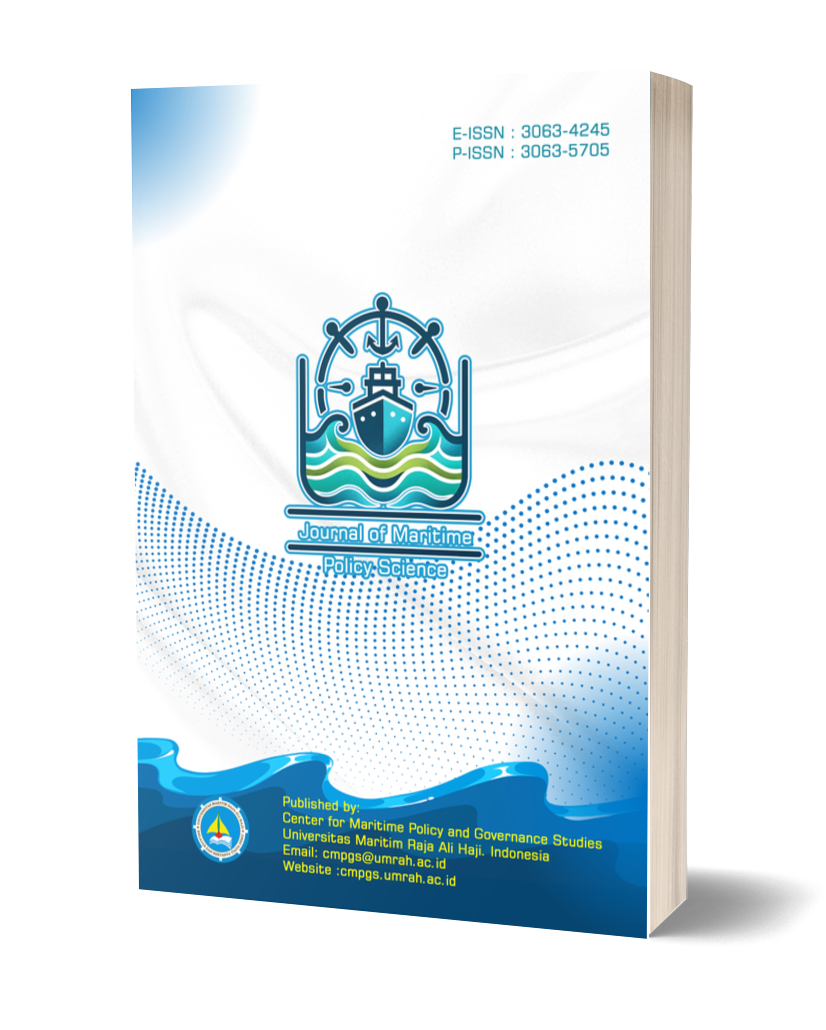Coral Reef Bleaching Crisis: Impacts on Indonesia's Marine Ecosystems and Coastal Economy
DOI:
https://doi.org/10.31629/jmps.v2i1.7351Keywords:
Blue Economy, Climate Change, Coastal Economy, Coral BleachingAbstract
Indonesia, as the world’s largest archipelagic state, is home to vast marine biodiversity, particularly coral reefs that support more than 25% of marine species despite covering less than 1% of the ocean floor. However, these vital ecosystems are increasingly threatened by climate-induced stressors such as rising sea surface temperatures and anthropogenic pressures including pollution, destructive fishing practices, and coastal development. The most visible manifestation of this crisis is coral bleaching, which compromises reef health and biodiversity. This study aims to explore the ecological and economic impacts of coral reef bleaching in Indonesia and propose strategic responses for sustainable marine governance. Employing a descriptive qualitative approach, the research draws upon peer-reviewed literature, government reports, and international assessments to analyze the drivers, consequences, and policy implications of coral bleaching. Findings reveal that elevated sea temperatures caused by global warming and phenomena like El Niño have led to mass coral bleaching events, reducing coral cover, disrupting marine food chains, and impairing ecosystem services. Socio-economically, the bleaching crisis has diminished fisheries productivity, reduced marine tourism revenue, and heightened economic vulnerability in coastal communities. Coral reef degradation also weakens natural coastal defenses, increasing exposure to storm damage. The study concludes that integrated policy interventions centered on conservation, community-based management, and climate adaptation are critical for reversing coral decline. Strengthening marine spatial planning, enforcing sustainable fishing regulations, and promoting blue economy principles can help safeguard coral reefs and enhance the resilience of Indonesia’s coastal economy.
Downloads
References
Adyasari, D., Pratama, M. A., Teguh, N. A., Sabdaningsih, A., Kusumaningtyas, M. A., & Dimova, N. (2021). Anthropogenic impact on Indonesian coastal water and ecosystems: Current status and future opportunities. Marine Pollution Bulletin, 171. https://doi.org/10.1016/j.marpolbul.2021.112689
Al Ismaili, S., Al Abri, I., Gulseven, O., Al-Masroori, H., & Dutta, S. (2024). Recreational value of different coral reefs richness levels in Oman. Journal of Outdoor Recreation and Tourism, 46. https://doi.org/10.1016/J.JORT.2024.100775
Bengtsson, M. (2016). How to plan and perform a qualitative study using content analysis. NursingPlus Open, 2, 8–14. https://doi.org/10.1016/J.NPLS.2016.01.001
Brown, B. E. (1987). Worldwide death of corals—Natural cyclical events or man-made pollution? Marine Pollution Bulletin, 18(1), 9–13. https://doi.org/10.1016/0025-326X(87)90649-7
Bryant, D. (2001). Reefs at risk: A Map-based indicator of threats to the world’s coral reefs. https://icsfarchives.net/12219/
Buanes, A., Jentoft, S., Maurstad, A., Søreng, S. U., & Runar Karlsen, G. (2005). Stakeholder participation in Norwegian coastal zone planning. Ocean and Coastal Management, 48(9–10), 658–669. https://doi.org/10.1016/j.ocecoaman.2005.05.005
Burke, L., Reytar, K., Spalding, M., & Perry, A. (2011). Reefs at risk revisited. World Resources Institute (WRI). https://bvearmb.do/handle/123456789/1787
Chen, P. Y., Chen, C. C., Chu, L. F., & McCarl, B. (2015). Evaluating the economic damage of climate change on global coral reefs. Global Environmental Change, 30, 12–20. https://doi.org/10.1016/J.GLOENVCHA.2014.10.011
Creswell, J. W., & Creswell, J. D. (2018). Research design. Qualitative, quantitative, and mixed methods approaches (5th ed.). SAGE Publications.
Eakin, C. M., Sweatman, H. P. A., & Brainard, R. E. (2019). The 2014–2017 global-scale coral bleaching event: insights and impacts. Coral Reefs, 38(4), 539–545. https://doi.org/10.1007/S00338-019-01844-2/METRICS
Fei, J., Lin, Y., Jiang, Q., Jiang, K., Li, P., & Ye, G. (2021). Spatiotemporal coupling coordination measurement on islands’ economy-environment-tourism system. Ocean and Coastal Management, 212. https://doi.org/10.1016/j.ocecoaman.2021.105793
Garmestani, A., Craig, R. K., Gilissen, H. K., McDonald, J., Soininen, N., van Doorn-Hoekveld, W. J., & van Rijswick, H. F. M. W. (2019). The Role of Social-Ecological Resilience in Coastal Zone Management: A Comparative Law Approach to Three Coastal Nations. Frontiers in Ecology and Evolution, 7. https://doi.org/10.3389/FEVO.2019.00410
Gunawan, R., & Samin, R. (2024). Application of the Public-Private Partnership Concept in Airport Development in Bintan Regency to Enhance the Coastal Economy. Journal of Maritime Policy Science, 1(1), 23–31. https://doi.org/10.31629/JMPS.V1I1.6875
Heidkamp, C. Patrick., & Morrissey, John. (2019). Towards coastal resilience and sustainability. 359.
Hodgson, G. (1999). A Global Assessment of Human Effects on Coral Reefs. Marine Pollution Bulletin, 38(5), 345–355. https://doi.org/10.1016/S0025-326X(99)00002-8
Hoegh-Guldberg, O., Mumby, P. J., Hooten, A. J., Steneck, R. S., Greenfield, P., Gomez, E., Harvell, C. D., Sale, P. F., Edwards, A. J., Caldeira, K., Knowlton, N., Eakin, C. M., Iglesias-Prieto, R., Muthiga, N., Bradbury, R. H., Dubi, A., & Hatziolos, M. E. (2007). Coral reefs under rapid climate change and ocean acidification. Science, 318(5857), 1737–1742.
Hughes, T. P., Kerry, J. T., Álvarez-Noriega, M., Álvarez-Romero, J. G., Anderson, K. D., Baird, A. H., Babcock, R. C., Beger, M., Bellwood, D. R., Berkelmans, R., Bridge, T. C., Butler, I. R., Byrne, M., Cantin, N. E., Comeau, S., Connolly, S. R., Cumming, G. S., Dalton, S. J., Diaz-Pulido, G., … Wilson, S. K. (2017). Global warming and recurrent mass bleaching of corals. Nature, 543(7645), 373–377.
Hughes, Terry., Barnes, M. L., Bellwood, D. R., Cinner, J. E., Cumming, G. S., Jackson, J. B. C., Kleypas, J., Van De Leemput, I. A., Lough, J. M., Morrison, T. H., Palumbi, S. R., Van Nes, E. H., & Scheffer, M. (2017). Coral reefs in the Anthropocene. Nature, 546(7656), 82–90.
McClanahan, T. R., Marnane, M. J., Cinner, J. E., & Kiene, W. E. (2006). A Comparison of Marine Protected Areas and Alternative Approaches to Coral-Reef Management. Current Biology, 16(14), 1408–1413. https://doi.org/10.1016/j.cub.2006.05.062
Nayak, P. K., & Armitage, D. (2018). Social-ecological regime shifts (SERS) in coastal systems. Ocean and Coastal Management, 161, 84–95. https://doi.org/10.1016/j.ocecoaman.2018.04.020
Quevedo, J. M. D., & Kohsaka, R. (2024). A systematic review of cultural ecosystem services of blue carbon ecosystems: Trends, gaps, and challenges in Asia and beyond. Marine Policy, 159. https://doi.org/10.1016/j.marpol.2023.105898
Rondon, M., Ewane, E. B., Abdullah, M. M., Watt, M. S., Blanton, A., Abulibdeh, A., Burt, J. A., Rogers, K., Ali, T., Reef, R., Mohtar, R., Sidik, F., Fahrenberg, M., de-Miguel, S., Galgamuwa, G. A. P., Charabi, Y. A. R., Arachchige, P. S. P., Velasquez-Camacho, L. F., Al-Awadhi, T., … Mohan, M. (2023). Remote sensing-based assessment of mangrove ecosystems in the Gulf Cooperation Council countries: a systematic review. Frontiers in Marine Science, 10. https://doi.org/10.3389/FMARS.2023.1241928
Satizábal, P., Dressler, W. H., Fabinyi, M., & Pido, M. D. (2020). Blue economy discourses and practices: reconfiguring ocean spaces in the Philippines. Maritime Studies, 19(2), 207–221. https://doi.org/10.1007/S40152-020-00168-0/METRICS
Spalding, M., Ravilious, C., & Green, E. P. (2001). World Atlas of Coral Reefs. In Integrative and Comparative Biology (Issue 2). University of California Press.
Westmacott, S., Teleki, K., Wells, S., & West, J. (1948). Management of Bleached and Severely Damaged Coral Reefs. In Development. https://books.google.com/books/about/Management_of_Bleached_and_Severely_Dama.html?hl=id&id=ZlAe_Tgpb_sC
Wilkinson, C. (2008). Status of coral reefs of the world. In Global Coral Reef Monitoring Network and Reef and Rainforest Research Centre. Australian Institute of Marine Science. https://portals.iucn.org/library/sites/library/files/documents/2004-074-2.pdf
Young, O. R., Osherenko, G., Ekstrom, J., Crowder, L. B., Ogden, J., Wilson, J. A., Day, J. C., Douvere, F., Ehler, C. N., McLeod, K. L., Halpern, B. S., & Peach, R. (2007). Solving the crisis in ocean governance place-based management of marine ecosystems. Environment, 49(4), 20–32. https://doi.org/10.3200/ENVT.49.4.20-33
Downloads
Published
Issue
Section
License
Copyright (c) 2025 Angelina Dwi Susanti, Friska Silaban, Lambok Febryan Aritonang, Yessi Tri Yosika br Sitompul (Author)

This work is licensed under a Creative Commons Attribution-ShareAlike 4.0 International License.
You are free to:
- Share — copy and redistribute the material in any medium or format for any purpose, even commercially.
- Adapt — remix, transform, and build upon the material for any purpose, even commercially.
- The licensor cannot revoke these freedoms as long as you follow the license terms.
Under the following terms:
- Attribution — You must give appropriate credit, provide a link to the license, and indicate if changes were made . You may do so in any reasonable manner, but not in any way that suggests the licensor endorses you or your use.
- ShareAlike — If you remix, transform, or build upon the material, you must distribute your contributions under the same license as the original.
- No additional restrictions — You may not apply legal terms or technological measures that legally restrict others from doing anything the license permits.















